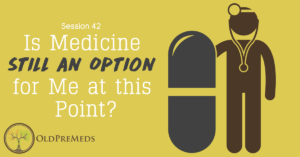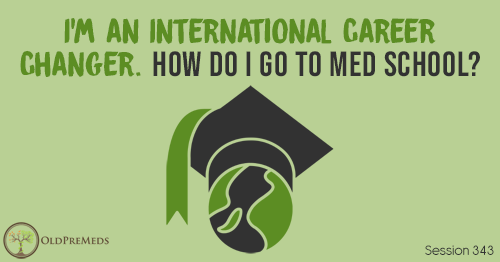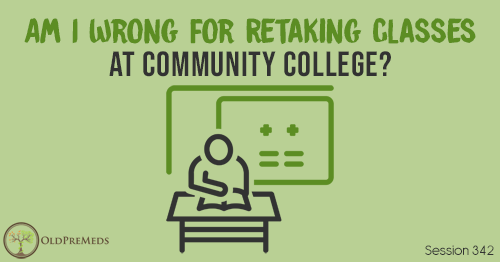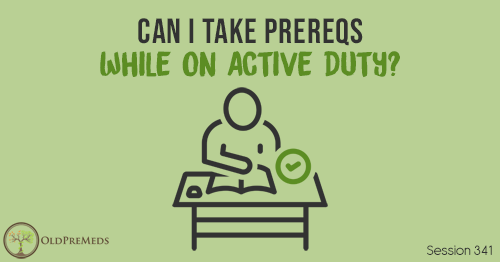Apple Podcasts | Google Podcasts
Session 42
Ryan takes another question over at the OldPreMeds.org forum and delivers the answer right here on to you. If you haven’t already, sign up a at the OldPreMeds.org and feel free to drop in any questions or issues you might have or join a collaborative community of nontraditioonal premedical and medical students.
OldPreMeds Question of the Week:
Poster is a 50-year old addiction specialist, with a great high school GPA, good undergrad GPA with a good trend in last years as an undergrad. She’s interested in going to DO schools because of the “holistic” philosophy. She has extensive medical experience working as CNA and volunteering in the Emergency Room at a Children’s Hospital. She realized she didn’t want to go down the nursing path and enjoyed working with addicts and alcoholics and has been doing this now. Her questions are as follows:
- Is medicine as option for me at this point in my life or should I just quit while I’m ahead and go for the clinical psych degree?
- Postbac courses vs. community college courses vs. university courses? (Their alma mater doesn’t allow students to take classes as non-degree seeking students add you need to declare a second bachelor’s)
- Can you combine community college courses and university courses?
- Will it be necessary to update the medical experiences?
Here are the insights from Ryan:
If you want to be a physician no matter what your age, move forward and try to be a physician.
Otherwise, when you take the psych degree and only to realize that you really should have gone for your medical degree, imagine spending money and spending five years when you did that only because maybe you were too old to get your medical degree
Don’t look at this from an age standpoint. If you’re thinking you’re too old to do it, you’re wrong.
If you think you don’t have the experiences to do it, you’re wrong. (You have to get them of course but just because you don’t have them yet doesn’t mean you’re not moving forward)
Therefore, the option is always YES to apply to medical school.
Postbac programs:
If you’re dedicated enough to do everything on your own and do all the necessary stuff (study for MCAT, volunteering, clinical experience), then you don’t need a formal postbac program.
Postbac program pro:
They will help you with everything along the way to ensure you’re prepared to apply to medical school.
Postbac program con:
They are usually expensive; oftentimes, worth it if you need that structure, but expensive.
Community college courses vs. university courses
The gold standard for this are the four-year universities
But you can still take community college courses if that’s what you need to do based on :
- Budget
- Schedule
- Location
So which is better?
There is no right or wrong answer because everyone’s situation is different.
Combination of community college courses and university courses
Yes, you can mix and match courses.
Caveat:
If you’re taking community college courses because you can’t handle the university courses, then that can be a red flag. So be ready to answer questions like why you took such course at a community college, whether thinking it’s going to be easier or just to get the A.
Ryan’s best advice:
Pick one or the other instead of switching back and forth or combining them.
Updating medical experience
If you’ve done it so long ago, reintroduce yourself to some experiences; although working as an addiction specialist working with patients is good patient care and valuable. But it doesn’t hurt to go and get a more updated experience like shadowing one-on-one with a physician just to understand what life is like as a physician.
Links and Other Resources:
The PreMed Years Podcast Session 74: Listen to Ryan’s interview with Carrie and her experience applying to medical school coming from a community college
Transcript
Introduction
Dr. Ryan Gray: The Old Premeds Podcast, session number 42.
You’re a nontraditional student entering the medical field on your terms. You may have had some hiccups along the way, but now you’re now ready to change course and go back and serve others as a physician. This podcast is here to help answer your questions and help educate you on your nontraditional journey to becoming a physician.
Welcome to the Old Premeds Podcast, where we take questions directly from the www.OldPremeds.org forum. If you are not a member over there go sign up for free over at www.OldPremeds.org.
I want to talk this week about a question from a user posting kind of a long story about her journey, it was an introduction post, and she had a lot of questions that I think every nontraditional student asks. And so I’m going to cover those here to make sure that you get your answer.
Questions from a Nontraditional Premed
Alright so first of all this student is an addiction specialist, going to school for an addiction field, clinical credentialing, and is fifty years old so an older nontraditional student. She has a great GPA in her grad school, she had a good GPA in her undergrad, and with a good trend the last couple years of her undergrad, and she’s interested in going to DO schools because she likes the ‘holistic philosophy.’ If you haven’t heard my take on that then you’d understand that I don’t really believe in the DO holistic philosophy. Let me rephrase that. I don’t believe that the holistic philosophy is unique to DO schools. But anyway, I digress. So this student talked about having a lot of medical experience in the past working as a CNA, and volunteering in the emergency room at a children’s hospital, and at that point realizing that she didn’t want to go down the nursing path, it sounds like she was going down the nursing path, and went and enjoyed working with addicts and alcoholics, and has been doing that now for I don’t know how long. And so a couple questions here. ‘Is medicine an option for me at this point in my life, or should I just plain quit while I’m ahead and go for the clinical psych degree?’ So that was her other option, she had a psychology undergrad, which maybe she’s thinking she’ll go get a clinical psychology degree- a Psy.D. program, a five year Psy.D. program. And so that first question, ‘Is medicine an option for me at this point in my life, or should I just plain quit while I’m ahead?’
Let me answer that. If you want to be a physician, no matter what age you are, then move forward and try to be a physician. If you go and get your Psy.D. degree and you’re working for five years, and you realize, ‘You know what? I really should have gone for my medical degree,’ guess what? You just spent five years and lots of money going and getting a Psy.D. degree when you did that only because you thought maybe you were too old to get your medical degree. So you can’t look at it from an age standpoint. If you think that you are too old to do it, you’re wrong. If you think that you don’t have the experiences to do it, then you’re wrong. You need to maybe get experiences, but just because you don’t have them doesn’t mean you can’t move forward. So to answer that first question, ‘Is medicine an option for me?’ The answer is yes, it is always yes no matter what. It is always yes. Well maybe not no matter what. Maybe if you’re a serial killer with a conviction on your record, but then you’d probably be in jail so maybe you wouldn’t be applying to medical school. So anyway, the answer is always yes.
And then this person asks, ‘Which is better, postbac courses, courses from a community college, or university courses?’ And they stipulate that their undergrad- their alma mater doesn’t allow students to take classes as non-degree seeking students, so you have to declare a second bachelor’s, and I’ve heard this a lot lately which is annoying. I don’t know why schools- it’s like free money for schools, why not let students pay for credits and take classes? I don’t understand the whole second bachelor’s thing. But anyway, there are a couple options. If you are dedicated and motivated enough to do everything on your own, and study for the MCAT, and get into volunteer work, and clinical experiences, then you don’t need a formal postbac program. The formal postbac programs are nice because they typically- and this is not all of them, but they typically will help you with everything along the way to make sure that you’re prepared to apply to medical school. They’ll help you prepare for the MCAT, they’ll kind of work in the clinical and volunteer experiences so it’s part of the curriculum. They’ll obviously cater the classes and everything towards what you need as a non- really a non-science major, as a psychology major. And so if you need that sort of structure, then postbac programs are nice. The one downfall with postbac programs is that they’re usually expensive. They’re oftentimes worth it if you need that structure, but they can be very expensive.
University Courses versus Community College
Now community college versus university courses. The gold standard in this program- or in this process is going to be university four year universities. The four year colleges are going to be the gold standard, but that doesn’t mean you can’t take community college courses. If that’s what you need to do based on your budget, and your schedule, and location, then that’s what you need to do and you’ll be okay if that’s what you need to do. Go and listen to- I did an episode with a girl named Carrie, a student named Carrie, who applied to medical school, she- her husband flew helicopters for the Army, and he was deployed a lot, and she had kids, and she was a nontraditional student and needed to take courses and all she could do them at were community colleges. And she did a great job communicating with medical schools, keeping them updated on her progress, and eventually was accepted to an MD program in Tennessee I believe. Go listen to that, that’s at The Premed Years Podcast. You can find that at www.MedicalSchoolHQ.net/74. Again www.MedicalSchoolHQ.net/74. If you don’t listen to The Premed Years, I highly recommend you do that as well as this one. A lot of- it’s more in depth a little bit, I talk to students, and physicians and other people, and we have deeper interviews and conversations about the process, whereas this podcast here I’m just answering questions and giving you short little snippets of information, but The Premed Years does a good job going a little bit deeper.
So basically the question which is better doesn’t necessarily- there is no right or wrong answer. There’s no good answer for which is better because every situation, everyone’s situation is going to be different, and so there is no better.
‘So could I do a combination of community college courses and university courses’ this person asks next, and definitely you can mix and match. The one caveat that if you are- if it looks like you’re taking community college courses because you can’t handle the university courses, then that’s a red flag. For instance you take Biology 101, Chemistry 101 at the four year university, but then you go and take Organic Chemistry at the community college. That would throw up a little bit of a question mark of why did you take it at the community college? Did you think it was going to be easier? Did you do it just to get the A? So you may have to answer those questions. If I were you I would probably pick one or the other instead of switching back and forth or taking a combination, because it looks maybe a little bit different, it looks a little weird.
So will it be necessary to update the medical experience as well? And this question, based on this person’s age at fifty, I’m assuming that the CNA experience was older, a long time ago, and so I would probably reintroduce yourself to some experiences. But working as an addiction specialist and working with patients, that’s good patient care and I think that’s valuable but it doesn’t hurt to go get a little bit more updated experience shadowing a physician, and getting that real one-on-one work with that physician, just so you understand what life is like as a physician. That’s the ultimate goal.
Final Thoughts
Alright I hope that answered that question, and I know those questions that were asked come up a lot for nontraditional students. So if you had those same questions, I hope that helped you on your journey. If you have another question, go to www.OldPremeds.org, click on the forum button, register for an account if you don’t already have one, and ask a question in there. You’ll not only hopefully get a response here on the podcast, but the amazing community at www.OldPremeds.org will help answer your question as well. So I hope you got a ton of great information out of the podcast today. Don’t forget that the Old Premeds Podcast is part of the Med Ed Media network where we have podcasts for everything related to the premed world, and soon beyond that as well. So go check that out, www.MedEdMedia.com. And as you continue down this journey, keep your head up, stay motivated, and remember why you are on this journey because there are going to be times where you’re going to want to turn back and quit, but if you remember why you’re on this journey you’re more likely to keep pushing forward and being successful.












